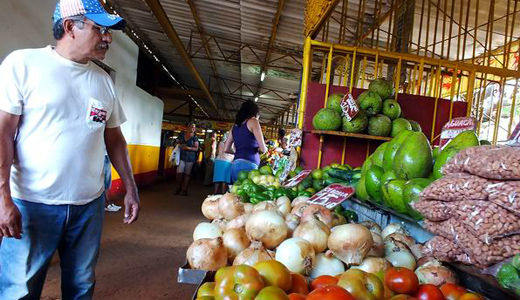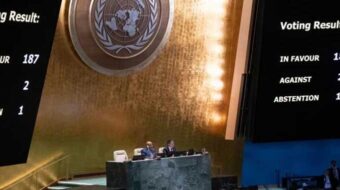
Agricultural production and food distribution have long been problematic in Cuba as indicated by the continuing necessity to import over 70 percent of food that Cubans consume and by some 2.5 million acres of tillable land still lying idle. Reforms so far have included land being made freely available to new and old farmers and relaxation of state controls on farming. Now new challenges are requiring attention.
Consumers have been complaining of skyrocketing prices and periodic shortages. Farmers point to retail food prices that are 500 or more percent higher than payments they receive from intermediaries. Additionally, food price hikes bring special pain to Cubans whose salaries are very low – as discussed by President Raul Castro in his report to the Seventh Communist Party Congress in April.
In that speech Castro cited “the behavior of prices for agricultural products [as] contrary to the spirit of measures adopted” for economic reform. That’s true too with “the reappearance of the phenomena of speculation and hoarding for the benefit of a few and the detriment of the many.” The “introduction of rules for supply and demand is not at war with the principle of a planned economy,” he declared.
The government announced such rules on April 22 and they went into effect on May 3. They had been discussed previously in the National Assembly and in sessions arranged by the Agriculture Ministry and finance officials for farmers and distributors.
The Ministry of Finances and Prices announced new retail prices for 28 kinds of food products with reductions of approximately 20 percent for lower quality and out-of-season goods. There are also new requirements that all other food can be sold at a retail markup of no more than 40 percent of the amount paid to the producer.
Various reports cited goals of “protecting the consumer and agricultural producers,” and of “gradually increasing the purchasing capacity of the Cuban peso.”
The pricing regulations apply to “all types of agricultural markets except those of supply and demand” and licensed self-employed food purveyors who rent space or sell from hand carts. Food producers’ direct sales to tourist enterprises, permitted under earlier reforms, are also exempt. Retail markets subject to the new rules include those operated by state agencies and markets set up by agricultural cooperatives and small independent farmers. Previous reforms had given each of these the right to sell food directly to consumers.
With its 12 separate enterprises and 188 business organizations “at the base,” the Agriculture Ministry’s National Union for Collection and Marketing (“Unión Nacional de Acopio”) is responsible for distributing food from producers to retailers, and it operates some retail food outlets. A Havana city agriculture official indicated that “734 markets and points of sale accounting for 70 percent of food products sold in Havana” will be subject to the new regulations. Yet that estimate doesn’t square with a report from a reporter for trabajadores.cu, a state-published newspaper, claiming that most food – 78 percent in one Havana municipality – currently “flies away” and never reaches state-authorized retailers.
Speaking on national television, government officials administering the regulations emphasized that efforts are underway to stimulate increased food production. For example, the National Union “has contracted for 49 percent of declared production by farmers [which represents] an increase of 20 percent for the first months of 2015.” That agency is working to increase the number and efficiency of food retailing facilities in Havana, Artemisa, and Mayabeque provinces.
Reformers recently closed down El Trigal in Havana, a large wholesale food market viewed as innovative at the time of its establishment in 2013. By way of explanation, the report mentioned “corruption and other illegalities” such as diversion of food products to the black market. Authorities dissolved the cooperative managing the market.
Thus corruption enters into the story of food marketing reform in Cuba. As noted by journalist Iroel Sánchez, “Cuba not only has to mobilize its reserves of economic efficiency but also those of social efficiency. These measures accomplish that by demonstrating the necessity to distribute and organize better and also the necessity to produce more.”
For him, social efficacy involves “preventing resources that ought to benefit everybody from being filtered through the sewers of disorder, corruption, and laziness. Investment in agriculture results from the effort of the country, from its doctors, its scientists, and from workers who’ve generated exports and thereby have restored financial confidence in the nation-and from teachers too who with their work still poorly remunerated, guarantee social stability and the educational level that makes the country attractive for foreign investment.”
This article is taken with permission from www.letcubalive.org
Photo: Abel Rojas | radiorebelde.cu












Comments